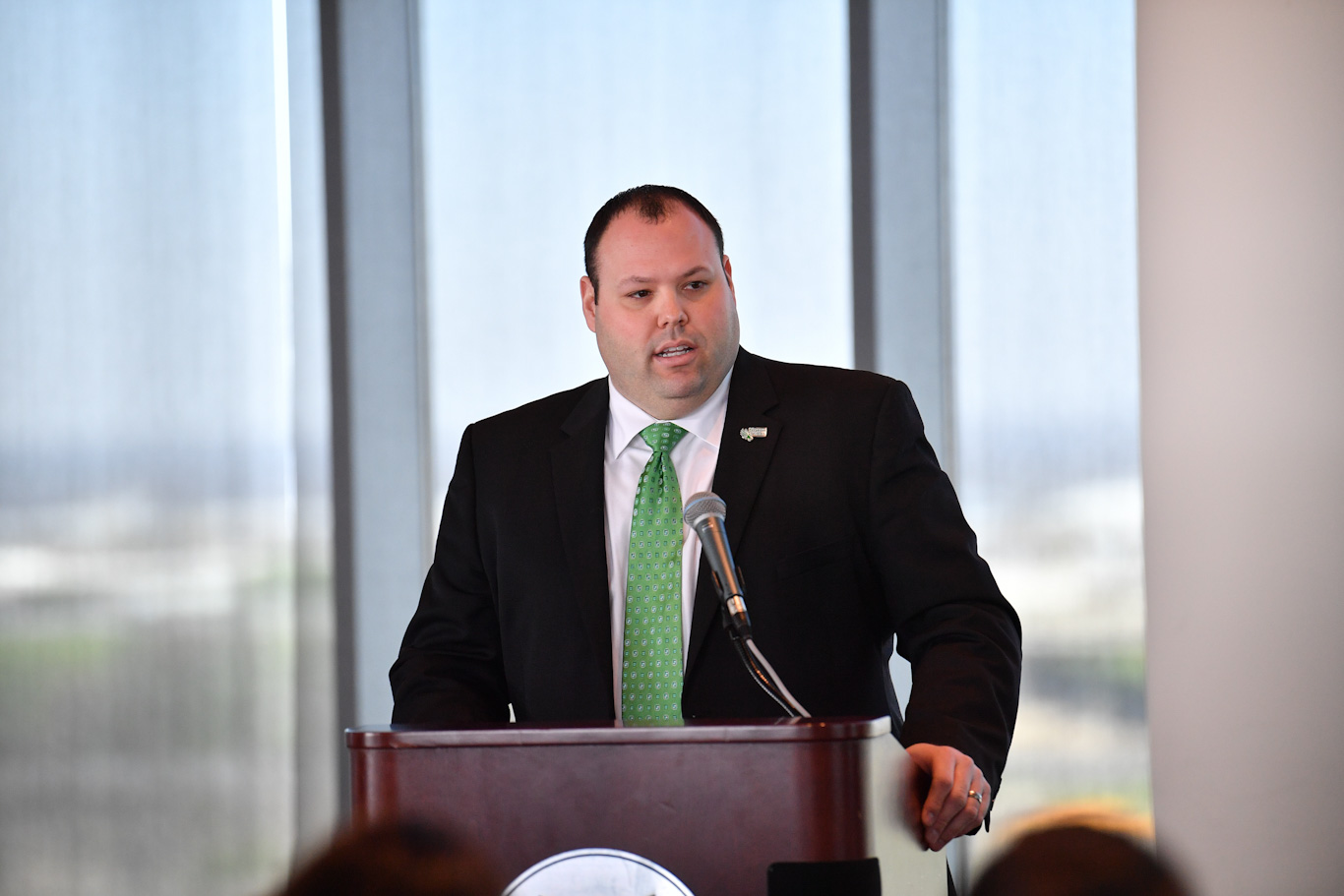
Since arriving at North Texas in July of 2016, Wren Baker has been a busy man. During his two-and-a-half years in Denton, Baker has seen the athletic department reach new heights both on and off the field. On the field, football has a pair of nine-win seasons, the Mean Green have won Conference USA championships in volleyball and women’s soccer, and basketball coach Grant McCasland has the men’s basketball program off to a 16-2 start, the best start in program history. Off the field, Baker has overseen record-setting fundraising, the addition of new facilities, and released the Light The Tower Master Plan. Baker recently sat down with CollegeAD to discuss the Light Tower Master Plan, the importance of releasing such a longterm plan, fundraising, the possible addition of baseball, and his special relationship with football coach Seth Littrell.
CollegeAD: With the Light Tower Plan, what made you decide to release a 20-year master plan, versus releasing a plan for the next five, seven, or even ten years?
Wren Baker: I felt like for us it was important to cast a broad vision of where we want to go from a facilities perspective. We had master plans as a campus and as an athletic department in the past but not to the extent that people were really aware of the vision in the long run.
The Light the Tower Master Plan, there’s no question that it’s ambitious and it takes into account a lot of projects, but at the same time, we’re making significant progress in a hurry. If you look at the last three years here, we’re near the completion of a $14 million soccer/track and field complex, we’re well underway and will be completed in August on a $17 million indoor practice facility. We’ve started the silent phase of fundraising for an athletics center expansion. In less than four years we well could blow through those short term projects, so we really wanted to have on the horizon those midterm projects and at that point, you’re putting enough out there that it would be more awkward to not release a long term vision. So that people know you have a vision for every sport and every program and a plan for them facility wise to be able to compete at the top of our conference and in this region and ultimately a facility that will allow them to be nationally competitive and nationally relevant. 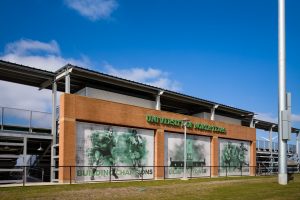
We made a decision to do that, we’re not the only school who has released a plan similar to ours. I felt like it was important to give people the entire vision as opposed to releasing bits and pieces. We’re a large institution, we have 38,000 students, we have over 200,000 living alumni in the DFW region, but because historically our athletic programs haven’t been as competitive as what they’ve been the last few years, we still have a lot of people who are disconnected. When you have that many living alumni, I felt like making sure everybody knew what our needs were and what our desires were and what our plan is. It’s important because you never know when somebody is going to come forward and have interest in being a part of a project and establishing a legacy and helping young people grow and develop both athletically and also socially and academically.
CollegeAD: How important was it show the alumni and donors the future plans, giving them something to grasp and hold on to?
Wren Baker: I think it’s critical because North Texas has always had a lot of potential but when I first got here and would go to speak at engagements, people would almost bristle up at the word potential because they had heard it so much for so long. I think the weight of the losses had really taken a toll, it was interesting because every other institution I had been at, the fan base placed a higher value on that institution’s place in the college athletics pecking order than what as a neutral person coming in I might have. It was the opposite at North Texas, coach (Seth) Littrell, coach (Grant) McCasland, Jared Mosley (Associate Vice President and Chief Operating Officer) as we would come in, we felt like this was a really good job, but I don’t think the fans necessarily put it there because they hadn’t had the competitive on the field success to make them feel proud of the institution.
When we first got here we made a huge priority to brand success, both in our history, which is why we’ve done things like a Joe Green statue, we did the throwback uniforms, we’ve had reunions of great teams in every sport, went back and did stories on great athletes and great moments in time. We really tried to make sure our fans knew that we’ve been very successful at times, we just haven’t consistently done it, but here is the plan to consistently do it, this is how we do it.
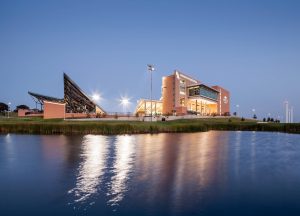 Facilities are a big part of that when you’re recruiting a 17-18-year-old student-athlete, nobody has cornered the market or trademarked the phrases that coaches use to recruit, they’re all saying the same thing. So kids are making judgments on a lot of things but they are hearing a lot of words from coaches and administrators. Facilities are tangible evidence that you are invested in them, it’s really important that you have a plan to develop those facilities to remain competitive.
Facilities are a big part of that when you’re recruiting a 17-18-year-old student-athlete, nobody has cornered the market or trademarked the phrases that coaches use to recruit, they’re all saying the same thing. So kids are making judgments on a lot of things but they are hearing a lot of words from coaches and administrators. Facilities are tangible evidence that you are invested in them, it’s really important that you have a plan to develop those facilities to remain competitive.
We’re in Texas where there are over 100 indoor practice facilities at high schools and we didn’t have one, that’s an issue. It’s important because you’re in this state and everybody recruits it and it’s important when you’re in this region because you have Baylor, TCU, SMU, Texas Tech all of those schools are in driving distance. It’s important for a lot of different reasons but I felt like it was really important for us.
CollegeAD: Is the new indoor facility still on schedule?
Wren Baker: It is, rain has caused some issues, but I think it will be open by the time fall camp begins. The indoor facility is huge for football but it’s also huge for women’s soccer, track and field will be able to get some work in there with the sprint lanes that will be available. Really all of our door programs will benefit from it.
Between the new indoor and when we follow that up with an expansion of our athletics center which houses strength and conditioning, athletic training, offices, and our football weight room, we will have facilities from a football perspective that are comparable and comparable to anybody.
CollegeAD: What’s the funding model you’re using for the indoor and other immediate facility projects?
Wren Baker: We’ve had a lot of donor activity. Prior to two years ago our best fundraising years were all close to $5 million, but under $5 million. Recently we’ve had a record year, raising $9.9 million.
Donors have contributed significantly to those facilities but we are at an institution where we do receive some campus support. The President, with all of the Deans and Vice Presidents, believes if you can raise the majority of a project he’s willing to contribute and help and we’ve taken advantage of that. More so on the soccer/track and field complex because the old stadium will be torn down and converted into parking.
The majority of the indoor practice facility funds comes from fundraising but there is some institutional support involved.
CollegeAD: With so many projects ongoing, when you arrived at North Texas did you have to revamp your external team and the way the team went about raising money?
Wren Baker: We’ve turned over some staff in that area and certainly changed the way we do things. But at the same time, we have a lot of existing staff members who have done a great job of adapting as well.
Coming in, as an AD having a strong external background, I was over the external side at Missouri and Memphis, I thought that’s where I would spend all of my time initially. What happened when I got here, all of my time was spent on the internal side, we were behind in strength and conditioning, in nutrition, in athletic training, in our life skills programming, academic support. All of those areas when I got here, I wasn’t much of an expert, but I knew what really functioning looked like and we were well below that. 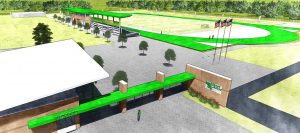
As many times as I’ve talked to people about the experience of being an AD, they ask me what my biggest surprise has been. My biggest surprise is that the first year to 18-months, I spent three-quarters of my time and energy fixing things internally. I feel like it was the right process to go through because you can have great marketing people, great salespeople, great fundraisers but if they’re selling a product that’s not winning they will have a very difficult time having success.
We spent a lot of time making sure we were as good as anybody in the areas on the internal side of the house that were directly tied to the development and growth of our student-athletes. Once we had that fixed, this last year, to year-and-a-half, we’ve spent a lot more time on the external side.
We’ve had our best start in men’s basketball, back-to-back nine-win football seasons, that will bring alumni back. They want to be proud of their institution, we all want to be proud of our alma mater, we’ve got to give them something to be proud about. Being able to win has really helped build external efforts.
CollegeAD: As part of the Light The Tower plan, one of the future projects listed is a baseball stadium. UNT currently doesn’t field a team, is there an appetite to add baseball? Is there a plan in place to explore the addition of baseball? Any potential timeline?
Wren Baker: There is great interest in baseball and if you look across the landscape of college baseball in Texas, we’re not the only school without a team, but the school’s that do have teams are all pretty good, there aren’t really any bad baseball teams in Texas. We look at that, look at our geographic location, look at what a school like Dallas Baptist has done and that certainly is a sport that we feel if we offered we could compete at a high level.
There is tremendous donor interest, and I believe in 2012 or 2013 North Texas had raised a significant amount of money and were headed towards adding the sport but there was a university commitment in that too, and the university went through a couple of tough years financially back then, so the project was put to the side and it never really got off the ground once that happened.
When I came in, as I spoke to every civic group multiple times, around the state in caravans, I would get a bunch of questions but I could guarantee one would always be about baseball. What I tell people is I do believe we will have baseball at North Texas.
Our master facility plan is just one part of our strategic plan and in that strategic plan is a spot where we’ve put down what we think each sport needs to be resourced in the top-third of our conference. I feel like with our geographic location and some other advantages, if we can resource our programs in the top-third of our league, then we can compete in championships in every sport.
So, I don’t want to start baseball unless we can resource them in the top-third of Conference USA and give them a chance to compete for championships. I also don’t want to bring another sport to our campus and give them that opportunity when I know we have a couple of sports that we’re stilling falling short of doing that today. It really a function of when do we get all of our current sports to where they need to be, and then we can look at expansion.
I have no doubt if today I turned my focus and attention solely to baseball, that within a year to 18-months we could probably have the funding together to build a facility and help underwrite the operating budget of the program for the first few years. The reality is that would be at the expense of the other projects such as the athletic center project which will touch every student-athlete that we have.
But I do believe North Texas will have a baseball team in the future. What the timeline looks like really is reliant on how long it takes us to get some of the other projects that we feel like are really important done.
CollegeAD: The success North Texas has had on the football field has generated interest in Seth Littrell from other programs. Have you had to get creative from a financial standpoint to keep coach and what does it say about North Texas that thus far you’ve been able to fend off other programs?
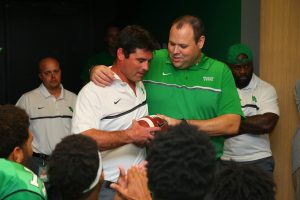 Wren Baker: We certainly have tried to stay proactive and address this. I think if you’re going to run a successful college athletic program you have to understand that people are your most valuable resource. With Seth and his staff, we’ve invested more in them. We gave coach a new contract and a significant raise after his first year which was a five-win season.
Wren Baker: We certainly have tried to stay proactive and address this. I think if you’re going to run a successful college athletic program you have to understand that people are your most valuable resource. With Seth and his staff, we’ve invested more in them. We gave coach a new contract and a significant raise after his first year which was a five-win season.
We had won one game the year before he was hired, five was a great step up. My philosophy is that I had seen enough that I felt really good about where we were going and I felt that if we give him a raise and extension now, he’ll remember that belief in him and the loyalty and support that we gave him later on when other schools come knocking.
After his second year when we won nine and won our division, we took another significant and greater step, we’ll certainly look at rewarding him for a second consecutive nine-win season. We’ve tried to stay aggressive, we’ve tried to put his compensation at a place where he wouldn’t be tempted to take other jobs. I sit with Seth often and try and understand what he thinks we need to continue to compete at a very high level and we go out collectively and work our tails off to get that for him. I think that’s the way that we’ve tried to proactively keep him. I know that he’s going to have suitors if he continues to win, I’m a fighter so I’m going to try and fight those off every time they come, but ultimately I want Seth to have what’s good for him. I love him as a person, care about him, he’s a good man, he’s done a great job in this program. So, if an opportunity comes that he thinks is the right one, that gives him a huge contract and makes his family happy, then I’m going to give him a hug and tell him how proud I am and how much I appreciate what he’s done here. But until that time comes we’re going to do everything we can to keep him here, keep him happy, and keep our momentum going.
